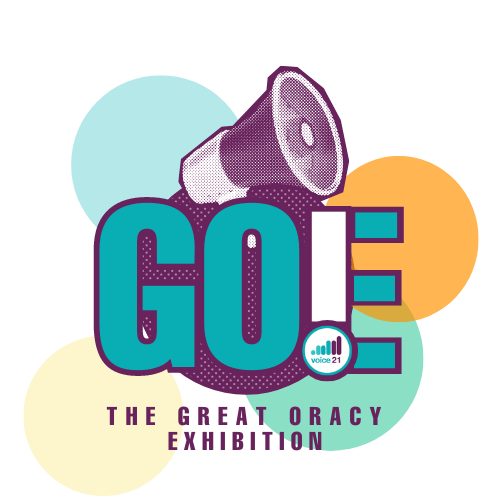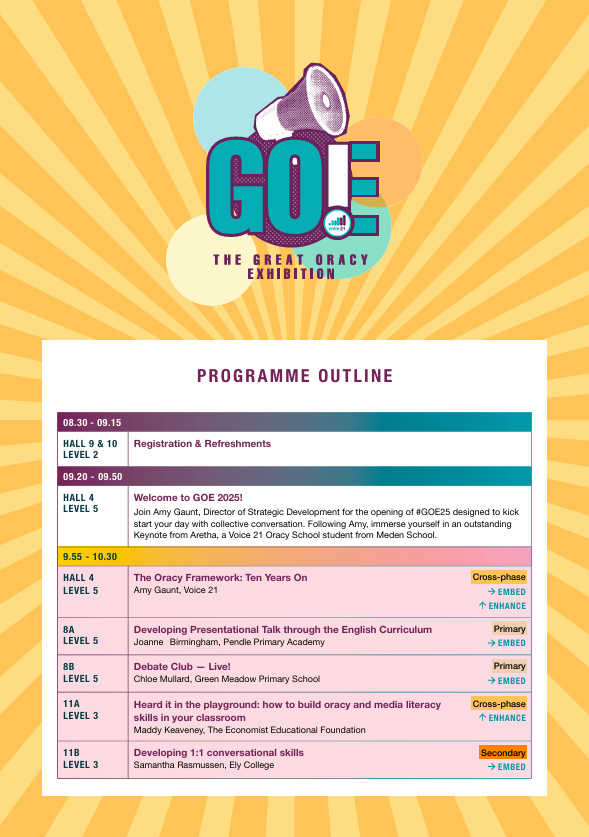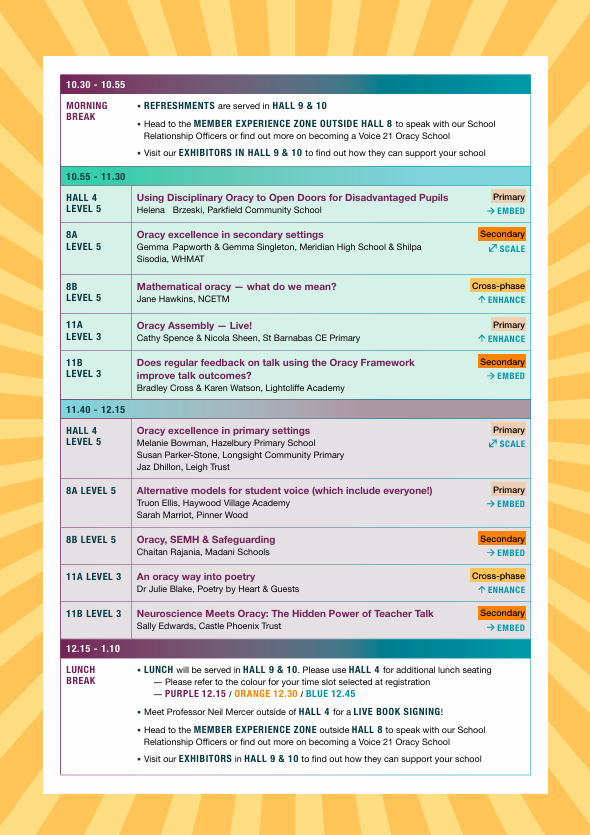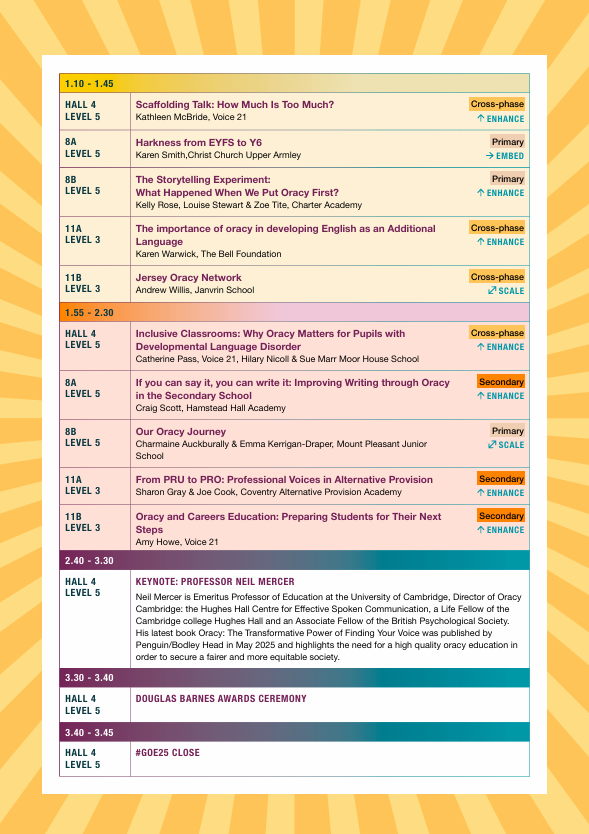Programme
The biggest day for oracy education
Our programme amplifies the voices of practitioners who are developing oracy education in settings across the UK.
The programme will feature over 25 sessions to choose from which are designed to help you embed, scale up and enhance oracy provision in your setting.
.png)
Keynote Speaker
Professor Neil Mercer
|
Neil Mercer is Emeritus Professor of Education at the University of Cambridge, Director of Oracy Cambridge: the Hughes Hall Centre for Effective Spoken Communication, a Life Fellow of the Cambridge college Hughes Hall and an Associate Fellow of the British Psychological Society. He is a psychologist whose research has focused on the development of children’s spoken language and reasoning abilities and teachers’ role in that development. He has worked extensively and internationally with teachers, researchers and educational policy makers. In 2019 he was given the Oevre Award by the European Association for Research into Learning and Instruction and in 2021 awarded the John Nisbet Fellowship by the British Educational Research Association, both for outstanding contributions to educational research. His latest book Oracy: The Transformative Power of Finding Your Voice was published by Penguin/Bodley Head in May 2025. Michael Rosen has described the book as ‘tremendous, necessary and enlightening’; and Alistair Campbell has called it ‘brilliant and inspiring’. Neil will be conducting a book signing on the day and you purchase a copy of his book ahead time here. Copies will also be available to buy on the day. |
.jpeg)
You can read more about individual parallel sessions below
09:55 - Developing Presentational Talk through the English Curriculum
Joanne Birmingham
Discover how Pendle Primary Academy transformed its English curriculum to prioritise oracy by replacing written outcomes with presentational tasks. Explore their planning process, lesson development, and three years of impactful results, including enhanced writing quality and pupil voice.
09:55 - Debate Club - Live!
Chloe Mullard
Discover how Green Meadows' ambitious Upper Key Stage 2 Oracy curriculum empowers pupils to become confident, articulate speakers. This dynamic session showcases live debating, explicit skill-teaching, and pupil voice, illustrating how structured oracy teaching raises aspirations, deepens learning, and equips students with lifelong communication skills valued by future schools and employers.
09:55 - Heard it in the playground: how to build oracy and media literacy skills in your classroom
Maddy Keaveney
Learn practical strategies to confidently explore current issues like climate change and misogyny in your classroom. This session offers tools to spark discussion, build critical thinking, and connect students through informed, open-minded dialogue across the curriculum.
09:55 - Developing 1:1 conversational skills
Samantha Rasmussen
Discover Ely’s conversation skills progression model, where students refine one-to-one dialogue with tutors, receiving targeted feedback to advance from simple to complex interactions. Learn how personalised tracking empowers pupils to own their oracy development, complementing broader frameworks.
09:55 - The Oracy Framework: Ten Years On
Ten years ago we developed the Oracy Framework in partnership with Oracy Cambridge- a tool that has since helped thousands of teachers to understand, articulate and develop students' speaking, listening and communication skills. But how has our thinking evolved over the past decade? What have we learnt from its use in classrooms across the country?
In this practical session, we’ll explore how the Framework can best support you to teach oracy explicitly and purposefully. You’ll hear about the most effective ways schools are using it, common pitfalls to avoid, and how to apply it to meet the needs of your students.
10:55 - Using Disciplinary Oracy to Open Doors for Disadvantaged Pupils
Helena Brzeski
Discover how Parkfield Community School empowers multilingual, disadvantaged pupils through disciplinary oracy, enabling them to articulate expertise across subjects. Learn to implement a progressive EYFS-Year 6 framework that elevates curriculum access, aspirations, and outcomes.
10:55 - Oracy Assembly - Live!
Cathy Spence
Experience a live oracy assembly where children confidently share opinions and adults model high-quality talk. Discover how embedded guidelines and praise foster a culture of communication, with attendees participating as speakers and talk detectives.
10:55 - Does regular feedback on talk using the Oracy Framework improve talk outcomes?
Bradley Cross
This session, featuring students, shares how Oracy Champions are embedding talk-rich learning in PSHE through structured sequences, explicit talk outcomes, and targeted feedback using the Voice 21 framework. It explores how this programme for Year 7 supports oracy development and aligns with the academy’s vision of becoming a talk-rich environment through research-informed practice.
10:55 - Oracy excellence in a secondary settings
Join two secondary Oracy Centres of Excellence to learn from their journeys to oracy excellence and the methods they used to implement a high quality oracy education in their different sessions. This panel will explore what excellence looked like for them and the impact that a high quality oracy education has had for their school community.
10:55 - Mathematical oracy - what do we mean?
Jane Hawkins
Learn how the NCETM's Maths Hubs programme is developing teachers' understanding of the significance of talk in the maths classroom. In this session, Jane will share how oracy sits at the heart of a mastery approach to mathematics - which seeks to enhance all students' confidence, enjoyment and progression within the subject.
11:40 - Oracy, SEMH & Safeguarding
Chaitan Rajania
Discover how Madani’s Cultural LitOracy framework empowers students to articulate challenges and seek support through structured dialogue. Learn strategies for fostering inclusive communication, building a safe school culture, and amplifying student voice across diverse backgrounds.
11:40 - Neuroscience Meets Oracy: The Hidden Power of Teacher Talk
Sally Edwards
Discover how brain-based language strategies foster neural safety, enabling confident dialogue. Learn three shifts: reframing feedback for dopamine-driven effort, co-creating norms to calm the amygdala, and using thinking stems to activate mirror neurons. Leave with a 30-Day Challenge to rewire classrooms for impactful oracy.
11:40 - Alternative models for student voice (which includes everyone!)
This session explores how Haywood Village Academy and Pinner Wood embedded high-quality oracy education by transforming whole-school practices. From inclusive weekly ‘Team Talks’ to pupil-led School Councils structured around oracy, both schools demonstrate practical strategies for elevating student voice, decision-making, and oracy skills across the curriculum and school culture.
11:40 - Oracy excellence in primary settings
Melanie Bowman, Susan Parker-Stone & Jaz Dhillon
Join 3 primary schools from across the country as they discuss their journeys to oracy excellence and the methods they used to implement a high quality oracy education in their different sessions. Led by Jo Brumby from Voice 21, this panel will explore what excellence looked like for them and the impact that a high quality oracy education has had for their school community.
11:40 - An oracy way into poetry
We think that oracy is integral to poetry, and that poetry is valuable for oracy.
Join us for a fun, practical introduction to the way Poetry By Heart can support building a culture of oracy within your school:
Experience live student poem recitations and understand the impact of Poetry By Heart on learners.
Take part in an interactive activity exploring oracy opportunities within one poem.
Hear from practitioners about their experience of developing this approach.
13:10 - The Storytelling Experiment: What Happened When We Put Oracy First?
Kelly Rose
Explore how oral storytelling rebuilds narrative instincts in children, fostering creativity and linguistic confidence. This session demonstrates how structured talk transforms writing outcomes, with hands-on techniques and insights into the impact of storytelling on imagination and pupil voice.
13:10 - Harkness from EYFS to Y6
Karen Smith
Discover our school’s journey implementing the Harkness method through staff CPD and student-led discussions from Early Years to Year 6. Witness transformative videos showcasing collaborative, inquiry-based learning that elevates critical thinking, confidence, and inclusive dialogue, fostering high expectations for all learners.
13:10 - Jersey Oracy Network
Andrew Willis
Discover how to build and grow a powerful oracy movement through practical workshops led by educators and third-sector leaders. Learn to craft and communicate your vision, engage reluctant stakeholders, measure impact effectively, and foster a culture of oracy that reaches beyond schools into wider community and government networks.
13:10 - The importance of oracy in developing English as an Additional Language
Karen Warwick
This workshop will briefly look at why oracy is fundamental for developing EAL and explore some simple and practical strategies to further develop social, linguistic and academic inclusion in your classroom so that EAL learners can be fully engaged in curriculum learning and can thrive and achieve their potential. Karen Warwick from The Bell Foundation will explore how an oracy-rich culture will support EAL learners regardless of their proficiency in English, and that this doesn’t need to be time consuming for the teachers!
13:10 - Scaffolding Talk: How Much Is Too Much?
Scaffolding talk through sentence stems and talk tactics can play a crucial role in helping all students access classroom discussion. But when do these scaffolds limit rather than liberate student talk?
In this practical session, we’ll explore the balance between providing structure and enabling students to express their ideas authentically. You’ll consider when and how to reduce scaffolding without compromising inclusion or quality of talk, helping your students move confidently from guided talk to independent discussion.
13:55 - Our Oracy Journey
Charmaine Auckburally
Learn how a school with 98% English Language Learners (EAL) achieved Outstanding OCE status by integrating oracy into its curriculum. Discover strategies for celebrating linguistic diversity, supporting EAL learners, fostering pupil voice, and empowering confident communication. Finally, learn how they developed an oracy-rich school cuture and the impact this has had on our students.
13:55 - If you can say it, you can write it': Improving Writing through Oracy in the Secondary School
Craig Scott
Discover how oracy strategies reduce cognitive load in writing by generating ideas through structured talk, informed by Voice 21 pedagogy and Gibbons’ critique of formulaic approaches. Learn to prioritise interpretation over prescriptive models, enhancing written quality across subjects.
13:55 - From PRU to PRO: Professional Voices in Alternative Provision
Sharon Gray
Discover how student-written GCSE revision rap lyrics merge Shakespearean verse with modern rhythms, showcased in the Belgrade Theatre’s Romeo and Juliet collaboration. Learn to harness lyrical oracy for curriculum memorability, using performances and recordings as evidence of progress.
13:55 - Oracy and Careers Education: Preparing Students for Their Next Steps
Employers consistently identify oracy as a key skill that school leavers often lack. Voice 21 Oracy Schools tell us that embedding oracy into careers education helps students feel more confident, articulate, and ready for the world beyond the classroom. We’ve been working with Royal Holloway University to develop some new resources to support students as part of their careers education. Join us to find out how you can integrate oracy into careers education at your school.
13:55 - Inclusive Classrooms - Why Oracy Matters for Pupils with Developmental Language Disorder
At least two children in every UK classroom have Developmental Language Disorder (DLD), yet it remains widely misunderstood. This engaging session with experts from Moor House School—leaders in DLD education—will equip you with practical strategies, answer your questions, and challenge the myth that oracy-rich teaching excludes pupils with DLD. Perfect for teachers passionate about oracy and inclusion, this panel will deepen your understanding and help you create a more supportive classroom. With DLD Day on 17th October, now is the perfect time to raise awareness and make a difference. Learn more: https://radld.org/dld-awareness-day.



